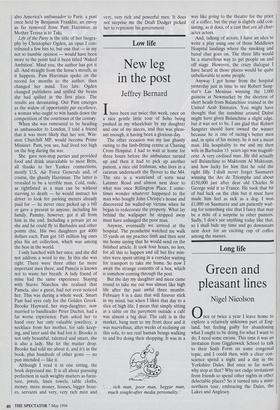Long life
Green and pleasant lines
Nigel Nicolson
There was one experience that I particu- larly wanted to enjoy, and one place that I longed to see. The experience was to ride the famous train from Settle to Carlisle; the place was the Roman fort of Hard- knott. They had one purpose in common, to violate the lovely desolate fastness that separates the Midlands from the true north, the railway by penetrating it, the fort by dominating it, but both, as it turned out, were useless.
It was an absurdity, an act of frustration, audacity and pique, to construct a railway through the most difficult country to be found anywhere in England, solely in order to rival the two south-north lines that exist- ed each side of it and belonged to other companies. But that is what, in the 1870s, the Midland Railway decided to do. The cuttings and embankments, long tunnels and high viaducts, took six years to com- plete and cost the lives of over 100 men. Its survival as a working line is even more astonishing than the motive for it, since it became redundant as soon as the compet- ing lines amalgamated, and British Rail determined to close it down. In 1988 the Minister of Transport supported them. `British Rail's priority', he said, 'is to invest in a modern railway, not pleasure rides for archaeologists.' If no such line existed and it were now proposed to desecrate these barren moors by steam and diesel, the out- cry would echo from dale to dale and far beyond. But such is the perversity of the English, that the line has become an object of intense affection, and a highly effective campaign was mounted to save it. A year later Paul Channon reversed his predeces- sor's decision, and the trains still run.
With equivalent determination the Romans built a road from their port at Ravenglass across the mountains to Win- dermere, and sited at Hardknott, its steep- est point, a fort large enough to hold an entire cohort of Dalmatians. It was main- tained and garrisoned at enormous cost for about a century, quite unnecessarily, because the mountains were pacified and thinly populated. How difficult it is to com- prehend the strategy of a remote age! The legions could have conquered and settled the whole of Scotland, as they did Wales, but, instead, they chose to build a wall across the English isthmus and sit behind it for 300 years. The same with Hardknott. They stayed there because it was there.
The cars serpentine up the Hardknott pass in a slow stream. The National Park have kept it narrow and dangerous in the futile hope that fewer people would risk its hairpin bends, but this is one of its attrac- tions. The Lake District is too glamorous, too accessible. The villagers complain end- lessly of 'the curse of the car' and the trivi- alisation of their glorious wilderness by boutiques selling jerseys decorated with sheep. The farmers respond surlily to one's greetings. We feel intruders. It is an insolu- ble problem. We tarnish by our presence what we have come to love.



















































 Previous page
Previous page